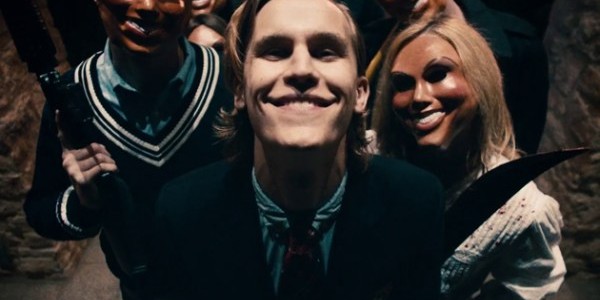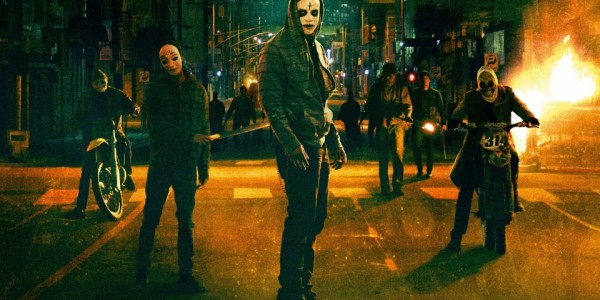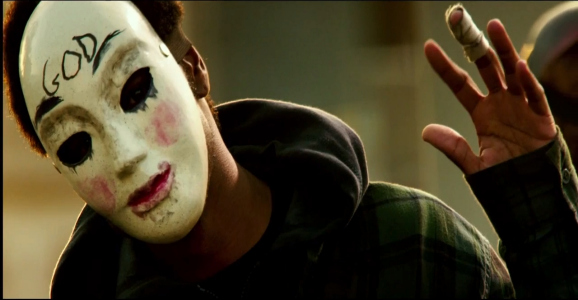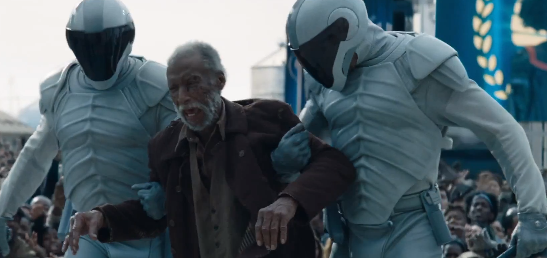Why Is The Purge So Unbelievable as a Concept?
"Why do so many people seem to draw the line at 'All Crime Is Legal for 12 hours'"

It's clear that writer and director James DeMonaco wants people to talk about
The Purge, a movie series that actively invites discourse with its speculative take on modern society. The imagery and rhetoric that these movies have evoked have always been sensationalist and attention-seeking. The upcoming sequel
Election Year, is capitalizing on the political zeitgeist with its title alone.
The central premise of the series revolves around the titular Purge, an annual 12 hour period in which all crime in the USA becomes legal, including murder. Supposedly, allowing people the opportunity to "purge" once a year is an effective way to bring crime rates down for the rest of it. The movies are set in the near future, less than a decade away and are ripe with political and social commentary.

There have been three movies thus far, with 2013's
The Purge, 2014's follow-up
The Purge: Anarchy and the aforementioned
The Purge: Election Year. The first two received mixed to negative reviews, but saw significant box office returns for their minuscule budgets, a fairly noticeable trend when it comes to horror.
Interestingly enough, a significant amount of the discourse surrounding
The Purge centers on the plausibility of the premise. There are a wide range of opinions. Some find it brilliant, others ludicrous and then there are those that diplomatically refer to it as 'intriguing'.

Broadly speaking, the majority agree that the concept of The Purge could be potentially interesting, but is either too ridiculous or not executed well enough to be believable.
What I find fascinating about this is the fixation on the premise. Discussing plot and narrative is, of course, a key part of critique and considering the series is literally named after its central premise, it seems logical that people would focus on it - yet it seems as though the idea of The Purge takes up a lot more of the conversation than usual.
To better illustrate this, let's move away from
The Purge for a bit and instead talk about
The Hunger Games.
 The Hunger Games
The Hunger Games is also set in a dystopian future and offers commentary on class divide, government control and the idea of murder as entertainment and a form of release. The games themselves, like The Purge, are a key plot point and constitute the narrative framework for the story.
It's not an apples to apples comparison, but there are enough similarities here to warrant a closer look. When people talk about
The Hunger Games, they don't really breakdown the premise like they would
The Purge. Suspension of disbelief seems to be in full effect here.
It's the differences between
The Purge and
The Hunger Games that allow us to see why one is so fixated on, while the other is more readily accepted.
 The Hunger Games
The Hunger Games works on more levels than just its social and political commentary. It's entirely possible to avoid that conversation altogether and just treat it as a form of escapism - an interesting, creative action movie with a badass female lead. Suspension of disbelief kicks in, because the viewer can simply accept the premise as part of a fictional setting with it own set of rules and internal logic.
The Purge as a concept, however, is basically baked into every aspect of the series. Its near future is a dark reflection of our own present.
The Purge wants to hold a mirror to society and make it look at itself. You can't avoid the conversation when it's basically the whole point of the movie.
The Purge wants to be controversial, it wants to be shocking, it wants to be discussed - and because it's based so closely on our reality except for one key difference, it's that much harder for suspension of disbelief to work.
The thing is,
The Purge desperately needs suspension of disbelief in order to have that meaningful conversation. It's next to impossible to take anything those movies have to say if you can't accept the central framing device, which is why the concept of The Purge is both the most interesting and the most problematic aspect of the whole series - and why it's basically morphed into generic action horror starring Frank Grillo with a bunch of weird imagery intended to be provocative. It played its hand and most people didn't care for it.
In the end, The Purge did prove itself to be a very divisive concept, but not necessarily in the way DeMonaco might have intended.
 It's clear that writer and director James DeMonaco wants people to talk about The Purge, a movie series that actively invites discourse with its speculative take on modern society. The imagery and rhetoric that these movies have evoked have always been sensationalist and attention-seeking. The upcoming sequel Election Year, is capitalizing on the political zeitgeist with its title alone.
The central premise of the series revolves around the titular Purge, an annual 12 hour period in which all crime in the USA becomes legal, including murder. Supposedly, allowing people the opportunity to "purge" once a year is an effective way to bring crime rates down for the rest of it. The movies are set in the near future, less than a decade away and are ripe with political and social commentary.
It's clear that writer and director James DeMonaco wants people to talk about The Purge, a movie series that actively invites discourse with its speculative take on modern society. The imagery and rhetoric that these movies have evoked have always been sensationalist and attention-seeking. The upcoming sequel Election Year, is capitalizing on the political zeitgeist with its title alone.
The central premise of the series revolves around the titular Purge, an annual 12 hour period in which all crime in the USA becomes legal, including murder. Supposedly, allowing people the opportunity to "purge" once a year is an effective way to bring crime rates down for the rest of it. The movies are set in the near future, less than a decade away and are ripe with political and social commentary.  There have been three movies thus far, with 2013's The Purge, 2014's follow-up The Purge: Anarchy and the aforementioned The Purge: Election Year. The first two received mixed to negative reviews, but saw significant box office returns for their minuscule budgets, a fairly noticeable trend when it comes to horror.
Interestingly enough, a significant amount of the discourse surrounding The Purge centers on the plausibility of the premise. There are a wide range of opinions. Some find it brilliant, others ludicrous and then there are those that diplomatically refer to it as 'intriguing'.
There have been three movies thus far, with 2013's The Purge, 2014's follow-up The Purge: Anarchy and the aforementioned The Purge: Election Year. The first two received mixed to negative reviews, but saw significant box office returns for their minuscule budgets, a fairly noticeable trend when it comes to horror.
Interestingly enough, a significant amount of the discourse surrounding The Purge centers on the plausibility of the premise. There are a wide range of opinions. Some find it brilliant, others ludicrous and then there are those that diplomatically refer to it as 'intriguing'.  Broadly speaking, the majority agree that the concept of The Purge could be potentially interesting, but is either too ridiculous or not executed well enough to be believable.
What I find fascinating about this is the fixation on the premise. Discussing plot and narrative is, of course, a key part of critique and considering the series is literally named after its central premise, it seems logical that people would focus on it - yet it seems as though the idea of The Purge takes up a lot more of the conversation than usual.
To better illustrate this, let's move away from The Purge for a bit and instead talk about The Hunger Games.
Broadly speaking, the majority agree that the concept of The Purge could be potentially interesting, but is either too ridiculous or not executed well enough to be believable.
What I find fascinating about this is the fixation on the premise. Discussing plot and narrative is, of course, a key part of critique and considering the series is literally named after its central premise, it seems logical that people would focus on it - yet it seems as though the idea of The Purge takes up a lot more of the conversation than usual.
To better illustrate this, let's move away from The Purge for a bit and instead talk about The Hunger Games. The Hunger Games is also set in a dystopian future and offers commentary on class divide, government control and the idea of murder as entertainment and a form of release. The games themselves, like The Purge, are a key plot point and constitute the narrative framework for the story.
It's not an apples to apples comparison, but there are enough similarities here to warrant a closer look. When people talk about The Hunger Games, they don't really breakdown the premise like they would The Purge. Suspension of disbelief seems to be in full effect here.
It's the differences between The Purge and The Hunger Games that allow us to see why one is so fixated on, while the other is more readily accepted.
The Hunger Games is also set in a dystopian future and offers commentary on class divide, government control and the idea of murder as entertainment and a form of release. The games themselves, like The Purge, are a key plot point and constitute the narrative framework for the story.
It's not an apples to apples comparison, but there are enough similarities here to warrant a closer look. When people talk about The Hunger Games, they don't really breakdown the premise like they would The Purge. Suspension of disbelief seems to be in full effect here.
It's the differences between The Purge and The Hunger Games that allow us to see why one is so fixated on, while the other is more readily accepted. The Hunger Games works on more levels than just its social and political commentary. It's entirely possible to avoid that conversation altogether and just treat it as a form of escapism - an interesting, creative action movie with a badass female lead. Suspension of disbelief kicks in, because the viewer can simply accept the premise as part of a fictional setting with it own set of rules and internal logic.
The Purge as a concept, however, is basically baked into every aspect of the series. Its near future is a dark reflection of our own present. The Purge wants to hold a mirror to society and make it look at itself. You can't avoid the conversation when it's basically the whole point of the movie.
The Purge wants to be controversial, it wants to be shocking, it wants to be discussed - and because it's based so closely on our reality except for one key difference, it's that much harder for suspension of disbelief to work.
The thing is, The Purge desperately needs suspension of disbelief in order to have that meaningful conversation. It's next to impossible to take anything those movies have to say if you can't accept the central framing device, which is why the concept of The Purge is both the most interesting and the most problematic aspect of the whole series - and why it's basically morphed into generic action horror starring Frank Grillo with a bunch of weird imagery intended to be provocative. It played its hand and most people didn't care for it.
In the end, The Purge did prove itself to be a very divisive concept, but not necessarily in the way DeMonaco might have intended.
The Hunger Games works on more levels than just its social and political commentary. It's entirely possible to avoid that conversation altogether and just treat it as a form of escapism - an interesting, creative action movie with a badass female lead. Suspension of disbelief kicks in, because the viewer can simply accept the premise as part of a fictional setting with it own set of rules and internal logic.
The Purge as a concept, however, is basically baked into every aspect of the series. Its near future is a dark reflection of our own present. The Purge wants to hold a mirror to society and make it look at itself. You can't avoid the conversation when it's basically the whole point of the movie.
The Purge wants to be controversial, it wants to be shocking, it wants to be discussed - and because it's based so closely on our reality except for one key difference, it's that much harder for suspension of disbelief to work.
The thing is, The Purge desperately needs suspension of disbelief in order to have that meaningful conversation. It's next to impossible to take anything those movies have to say if you can't accept the central framing device, which is why the concept of The Purge is both the most interesting and the most problematic aspect of the whole series - and why it's basically morphed into generic action horror starring Frank Grillo with a bunch of weird imagery intended to be provocative. It played its hand and most people didn't care for it.
In the end, The Purge did prove itself to be a very divisive concept, but not necessarily in the way DeMonaco might have intended.